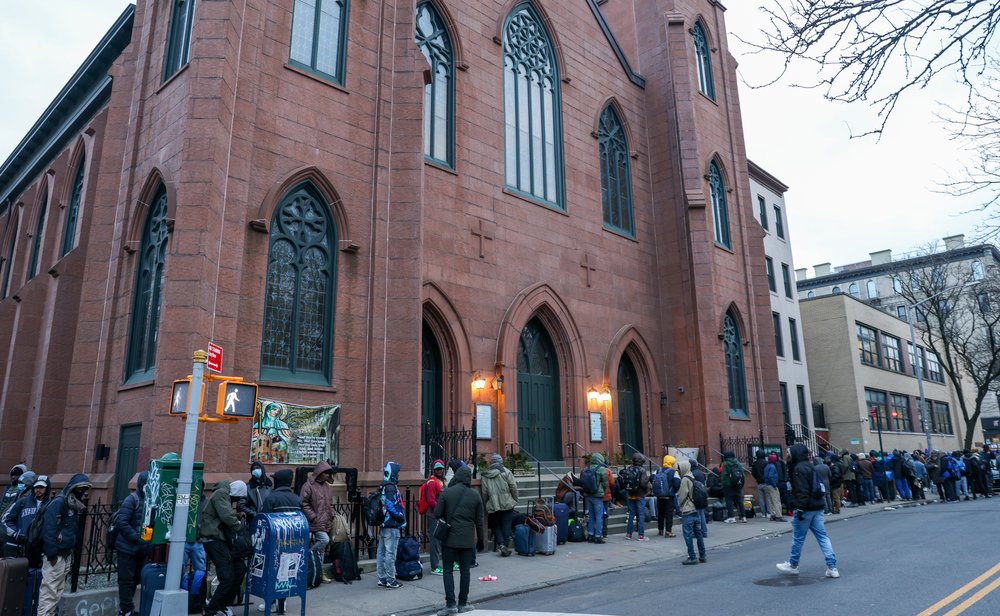New Yorkers driven by deportation fears are flooding immigration lawyers with questions
Jan. 1, 2025, 5:01 a.m.
Here’s some of the legal advice and guidance lawyers are sharing ahead of President-elect Trump’s promised “mass deportation.”

New Yorkers are flooding the phone lines of immigration attorneys, seeking legal advice ahead of President-elect Donald Trump’s inauguration and promised “mass deportation.”
Call volume in recent weeks to the local Immigrant Defense Project’s legal hotline is more than twice as much as this time last year, according to hotline director Genia Blaser.
“Folks are nervous and confused,” said Kendal Nystedt, legal director of UnLocal, a nonprofit provider of immigration legal services. “We can expect that the ground will shift under our feet, often without much notice and on a continual basis.”
An estimated 412,000 immigrants without permanent legal status resided in New York City as of 2022, according to City Hall data. And since spring of that year, more than 220,000 migrants have arrived and sought shelter in the city, as part of a nationwide surge in immigration. About 55,000 migrants remain in about 200 shelters maintained by the city.
People who call the hotline have sought guidance on asylum applications and filing for other protections against deportation, according to attorneys. Those in deportation proceedings have been inquiring if and how they can resolve their cases.
Many have asked how they should prepare for enforcement under Trump, who has not yet set forth details of his plans.
Immigration lawyers shared their answers to some of the most-asked questions ahead of Trump’s return to the White House.
How should immigrants prepare for the crackdown promised by Trump?
In short, brush up on your rights. Just as with police investigations, those caught up in immigration enforcement actions should know their rights. That includes the right to remain silent when questioned by U.S. Immigration and Customs Enforcement agents, according to immigration advocates and immigration attorneys interviewed by Gothamist.
Residents and employers also have a right to refuse permission to enter or search their homes and businesses unless presented with warrants. A warrant should be signed by an immigration judge, not a U.S. Citizenship and Immigration Services official.
Noncitizen parents should also come up with emergency plans for their citizen children if they are detained or deported. Parents should decide on emergency caretakers for their children; a caretaker should get copies of important documents, like passports, birth certificates, medical and school records, along with medical and school contact information.
Should immigrants rush to file asylum and other relief applications?
Each immigration case is unique and requires a different approach. But in some cases, particularly for those immigrants already in deportation proceedings, attorneys are urging clients to apply immediately for asylum or other relief currently available.
Trump has vowed to end a program called Temporary Protected Status, which allows people from 17 countries deemed unsafe — including Venezuela, Ukraine and Afghanistan — to remain and work in the United States.
“The law is the law as it is today, and if you qualify today, you should apply today,” said Desireé Hernández Sánchez, director of immigration legal services at Catholic Charities of New York. “But also changes could be made retroactively.”
For those who haven’t had contact with immigration officers, the calculus can be more complicated. Deborah Lee, attorney-in-charge at the Legal Aid Society's immigration law unit, said people may wonder: “If I file for asylum, is that going to unnecessarily put attention on me?”
Lee said the answer depends on the strengths of an applicant's claim, among other factors. Once more, the lawyers say each case is different, which is why it’s important to seek legal help tailored for specific circumstances.
What protections does New York’s status as a “sanctuary city” provide?
New York City is considered a so-called “sanctuary city,” meaning that local laws limit the extent to which city agencies are permitted to cooperate with immigration enforcement officers. But attorneys say the protections only go so far.
“Just because New York may be thought of as a sanctuary city, it doesn't mean that people in New York are immune from ICE enforcement,” said Cheryl Andrada, an immigration attorney based in the Legal Aid Society's public defender’s office in Manhattan.
Local police and corrections officers can’t help ICE deport someone unless the person has been convicted of a violent or serious crime or is on the federal terrorist watch list, but little stands in the way of federal enforcement agents acting on their own and going after known targets.
Getting arrested can also put someone on ICE’s radar, no matter local policies. When someone is arrested, their fingerprints are sent to the FBI, and under a President George W. Bush-era program called “Secure Communities,” that information is also sent to the Department of Homeland Security, which oversees ICE.
And one more caveat: Mayor Eric Adams, who has been critical of the city's sanctuary measures, said recently he would take executive action to weaken the protections.
How else to get immigration legal assistance?
Immigration attorneys say the specifics of each individual’s case are different, and those with questions should seek legal help. And New York City is home to a plethora of pro bono options.
The Immigrant Defense Project, a local immigrant advocacy group, has a legal hotline that offers referrals for pro bono immigration attorneys at 212-725-6422. The Mayor's Office of Immigrant Affairs also has a hotline that offers information on how to find free immigration help at 800-354-0365.
For NYC migrants, just getting inside immigration courthouse is a feat Provide a lawyer for every migrant? NYC comptroller says it’ll pay off. From off-books cleaner to legal aide: NY migrants are getting work permits more quickly White House will help some NYC migrants get work permits, but offers no sweeping action